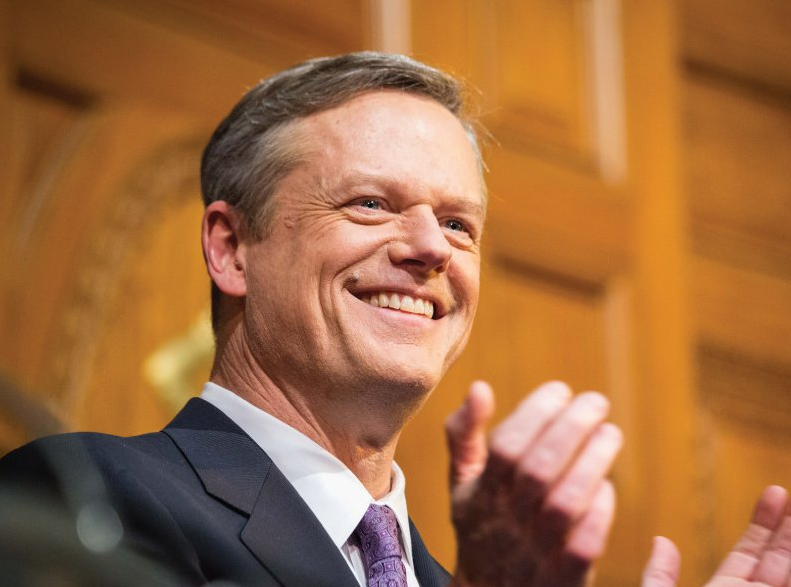latest
Governor Baker announces climate programs, local aid, sports betting plan

At the Massachusetts Municipal Association’s (MMA) Annual Meeting today, Governor Charlie Baker and Lt. Governor Karyn Polito outlined a number of initiatives to invest in the Commonwealth’s communities including new climate adaptation programs and significant support for local aid. These proposals will be filed next week as part of the Administration’s Fiscal Year 2020 (FY20) budget.
“Over the last four years, we have increasingly witnessed the effects that climate change has on communities and infrastructure across the Commonwealth, and know that the investments we make today are critical to ensure cities and towns are prepared to face the challenges of tomorrow,” said Governor Charlie Baker. “This proposal will build on the over $600 million we have already invested to mitigate and prepare for the adverse effects of climate change and help to build more resilient communities, and we look forward to working with the Legislature to get this passed.”
“The Commonwealth’s communities have a reliable partner in our Administration, and this budget will continue the commitment we have made to increase local aid for cities and towns,” said Lt. Governor Karyn Polito. “We are also filing a Chapter 90 bill today, which will support important transportation infrastructure improvements in all 351 communities.”
Climate Adaptation Programs
To build on the work the Administration has done to prepare the Commonwealth’s communities to withstand the effects of climate change, the Administration will propose to dedicate $75 million in FY20 for a substantial and sustained investment to protect Massachusetts’ residents, communities, economy, and infrastructure. This investment will be supported by a modest increase in the excise on real estate transfers, and will amount to $137 million on an ongoing, annualized basis for the Global Warming Solutions Trust Fund.
This funding will be made available for cities and towns to invest in climate-smart infrastructure and will support other initiatives to help build resilient communities including:
· Loans, grants, and other assistance to communities for investments identified through the Municipal Vulnerability Preparedness program, including stormwater upgrades, dams and flood controls, drainage and culvert improvements, drought mitigation strategies, nature-based solutions and other adaptation strategies
· Preparation of detailed state asset vulnerability assessments that use climate change projections and risk analysis to direct policy and investment to protect Massachusetts residents’ health, safety, and well-being while continuing to steward the natural resources of the Commonwealth
· Assistance for state and local agencies in prioritizing, planning, and retrofitting these vulnerable assets, including dams and flood controls, transportation infrastructure, critical care facilities, water resources, and other key infrastructure
· Development and implementation of a climate-smart land use framework, including a coastal protection strategy, as well as regionally appropriate resilient land use practices for diverse inland communities
Under the proposal, the Commonwealth’s deeds excise rate, paid at time of sale, is proposed to increase from $2 per $500 of value to $3 (from $1.50 per $500 of value to $2.50 in Barnstable County). This represents an all-in rate increase of 0.228. The excise is paid by the seller upon the transfer of property.
“The Baker-Polito Administration has assembled a fiscally-responsible budget for Fiscal Year 2020 and we are pleased that the plan supports the priorities of the Commonwealth’s cities and towns,” said Secretary of Administration and Finance Michael J. Heffernan. “We are proud of our continuing collaboration with local officials as we work together to continue meeting the needs of the people of Massachusetts.”
Chapter 90, Unrestricted General Government Aid, and Community Compact
The Administration will also include a total of $1.129 billion in unrestricted general government aid, or UGGA, an increase equal to 100% of the projected state tax revenue growth rate (2.7%) in the FY20 budget. This is an increase of $30 million over Fiscal Year 2019, and would represent an increase of nearly $183 million since the Baker-Polito Administration took office.
The FY20 operating budget proposal will include $6.8 million for Community Compact-related programs. All 351 cities and towns have signed a compact with the state and have chosen a total of 900 best practices to address the needs of their communities. Since 2015 the Administration has provided $22.8 million to municipalities through the Community Compact program, representing a combination of operating and capital grants, through three programs: the best practices grant program, the efficiency and regionalization grant program and the IT grant program.
In the FY20 operating budget, the Administration will propose $2 million for the best practices program and $2 million for the efficiency and regionalization program. The Administration also plans to include $3 million in its FY20 capital investment plan, which will be released later this year, to continue the compact’s IT grant program.
The Administration will include $2.8 million in FY20 for the District Local Technical Assistance Program, which supports the Commonwealth’s 13 regional planning agencies with technical issues dealing with economic development, housing, transportation and environmental projects at the local level.
The Lt. Governor also announced that the Baker-Polito Administration today filed a bill seeking $200 million in Chapter 90 transportation funds, which will support all 351 cities and towns in Massachusetts. Since taking office in 2015, the Baker-Polito Administration has awarded a total of $940 million through the Chapter 90 formula, including $100 million on its first day in office.
Governor Charlie Baker also announced yesterday plans to file legislation that would permit people in Massachusetts to wager on professional sports. The proposal would utilize the existing regulatory structure for gaming licensing in Massachusetts, including enforcement powers of the Massachusetts Gaming Commission (MGC), the prohibition on wagering by anyone under 21 years of age and penalties for various violations.
“Expanding Massachusetts’ developing gaming industry to include wagering on professional sports is an opportunity for Massachusetts to invest in local aid while remaining competitive with many other states pursuing similar regulations,” said Governor Baker. “Our legislation puts forth a series of commonsense proposals to ensure potential licensees are thoroughly vetted and safeguards are in place to protect against problem gambling and illegal activity. We look forward to working with our colleagues in the Legislature to pass this bill into law.”
“Over the last seven years, the Massachusetts gaming industry has grown into an economic driver for thousands of jobs associated with construction, hospitality and tourism,” said Lt. Governor Polito. “The Massachusetts Gaming Commission has developed a comprehensive set of regulations and passing this bill into law will allow the proper oversight of the industry’s next chapter in addition to providing critical support to the Commonwealth’s cities and towns.”
The administration’s proposal would authorize the MGC to issue newly-created sport wagering licenses to the current Category 1 resort casino licensees (MGM-Springfield and Encore-Everett) as well as the Category 2 licensee (Plainridge). A current gaming license would be required to operate an onsite sports wagering lounge. Such opportunities would be extended to a Category 1 licensee should one be approved for Region C in the future.
Additionally, holders of newly-created gaming licenses would be able to provide sports wagering online, or contract with an entity to provide the service. Online sports pool operators would need to be licensed as a gaming vendor and the agreement would need to be approved by the MGC.
Separate from existing Category 1 and Category 2 licensees, the administration’s proposal also allows for unaffiliated entities to conduct online only sports wagering. Online only operators would need to be fully qualified and licensed by the MGC as a sports wagering licensee under the current process set forth by the Expanded Gaming Statute.
The application fee for an initial license would be set at $100,000 under this proposal with the funds dedicated to supporting the MGC’s administration of the application process. Once approved, an applicant will pay a licensing fee of not less than $500,000 that will need to be renewed every five years. In person sports wagering licensees would pay a tax rate of 10% and online wagering licensees would pay a rate of 12.5%. The revenue generated from renewals, in person and online wagering would exclusively go to the Gaming Local Aid Fund to finance local aid distributions, mirroring the current system for directing revenue from the Category 2 licensee. To level the playing field, a 12.5% tax rate would also be applied to daily fantasy sports contests which are currently untaxed. The administration anticipates this proposal would generate $35 million in revenue in the upcoming Fiscal Year 2020 that will benefit all 351 cities and towns in the Commonwealth.
The legislation calls on the MGC to promulgate necessary regulations to implement sports wagering, including protections for people placing wagers, a cashless system for sports wagering and a verification system to approve age and identity of potential online users. The MGC will also be asked to include the impact of sports wagering on individuals, businesses and the economy in its annual research report, in addition to annual assessments on non-category 1 or 2 licensees to help support compulsive gambling support programs.
Similar to the Commonwealth’s current regulations governing daily fantasy sports, wagers would not be permitted on high school, collegiate or amateur events. Wagers would also not be permitted on Esports.
-

 Community7 years ago
Community7 years agoNational Shrine of La Salette Festival of Lights 2017 set to begin
-

 Community6 years ago
Community6 years agoMassachusetts State Police looking for good home for retired dogs
-

 Crime6 years ago
Crime6 years agoFall River ranked most dangerous city in Massachusetts according to report
-

 latest7 years ago
latest7 years agoDurfee student allegedly overdoses on marijuana
-

 Community6 years ago
Community6 years agoVideo of Fall River Police goes viral
-

 Causes6 years ago
Causes6 years agoMissing Fall River woman found deceased
-

 Crime6 years ago
Crime6 years agoFall River Police add names to most wanted list
-

 Causes6 years ago
Causes6 years agoFall River teenager reported missing has been found




